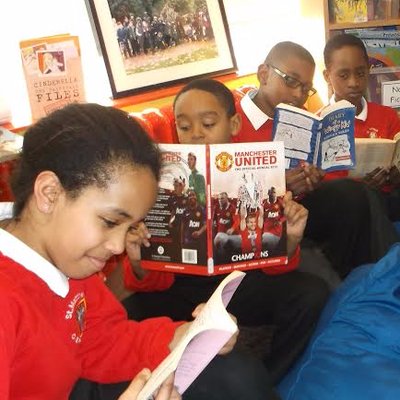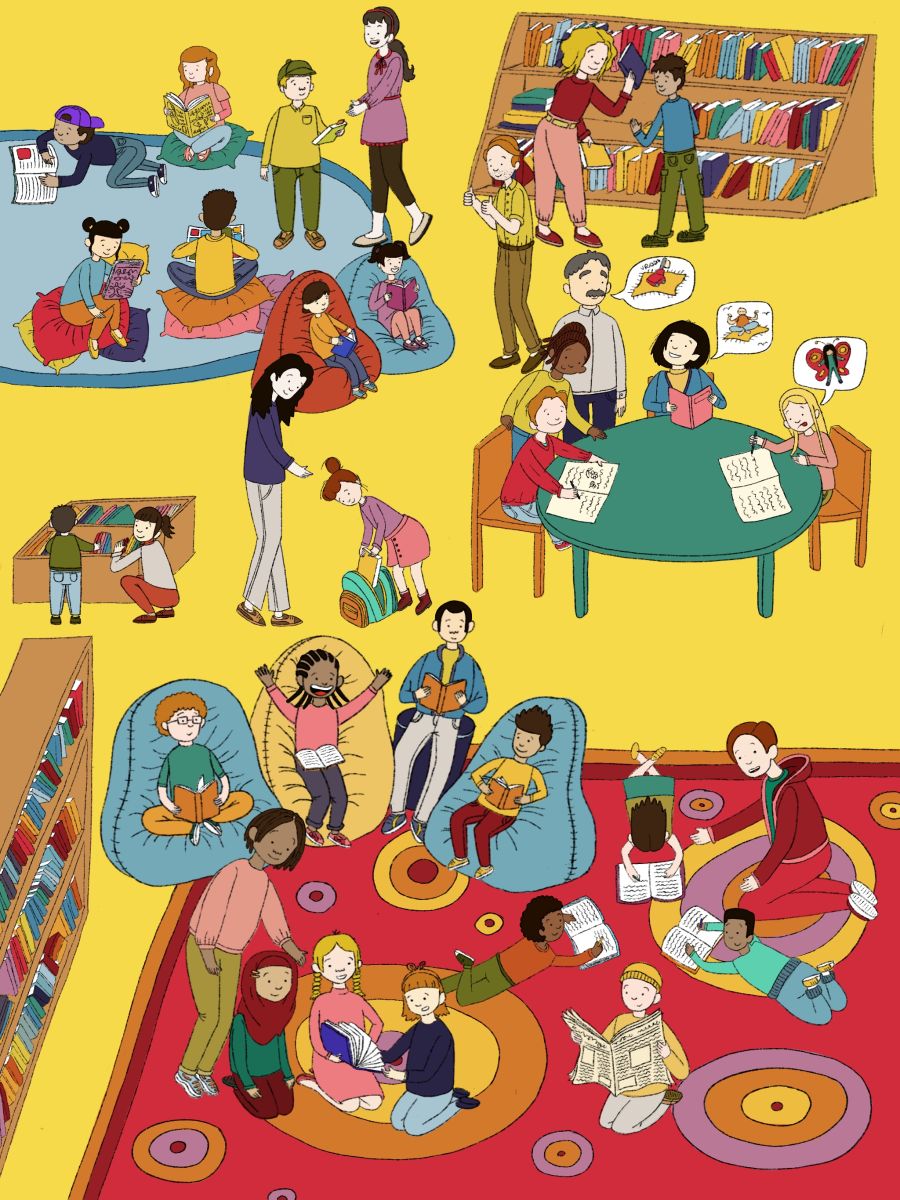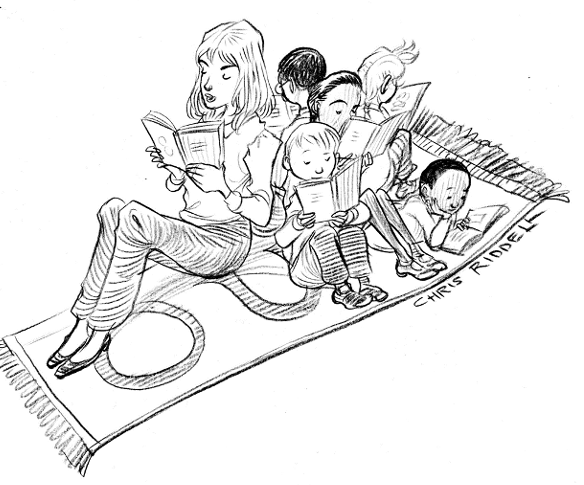Special initiative: Reading for Pleasure
 OU research in this area has shaped a Reading for Pleasure (RfP) movement which seeks to enable practitioners to enrich their knowledge and practice, schools to create cultures of reading and stronger links with parents and young readers who benefit from being members of vibrant reading communities.
OU research in this area has shaped a Reading for Pleasure (RfP) movement which seeks to enable practitioners to enrich their knowledge and practice, schools to create cultures of reading and stronger links with parents and young readers who benefit from being members of vibrant reading communities.
Click on the tabs to find out more about the diverse initiatives created from the original Teachers as Readers project and subsequent research.
- Reading and Writing for Pleasure: New Research
- Reading for Pleasure Website
- The Reading Schools Programme: Building a Culture of Reading
- OU/UKLA Teachers' Reading Groups
- Reading at Home Support
- Value of digital reading for children's literacy
Reading and Writing for Pleasure: New Research
This three-year research project funded by the Mercers’ Company examined the approaches that most effectively nurture children's reading and writing for pleasure. An extensive literature review was undertaken of research in these areas, and data was collected from six London based programmes that work with children and young people. The OU team combined these two pieces of work to create a Reading and Writing for Pleasure: Framework for Practice.
Reading for Pleasure website
The Teachers as Readers (TaRs) research project was a two phase OU/UKLA project which explored children's and teachers’ reading lives and established effective ways to support Reading for Pleasure (RfP).
The OU RfP website is informed by the TaRs project and aims to support a vibrant professional community of teachers, student teachers, librarians, teaching assistants and English subject leaders.
The research found that in order to effectively nurture children’s RfP, they needed to develop:
- Knowledge of children’s literature and other texts
- Knowledge of children’s reading practices
- A Reading for Pleasure pedagogy
- social reading environment.
- reading aloud,
- informal book talk and recommendations,
- and independent reading time
- As Reading Teachers: teachers who read and readers who teach
- Reading communities which are interactive and reciprocal.
So that teachers and professionals don’t miss out on these new resources, they can sign up to a free monthly newsletter to keep connected and up to date.
The Reading Schools Programme: Building a Culture of Reading
Since 2018, the OU team have worked with over 400 primary and secondary schools through the Reading Schools Programme on whole school development of Reading for Pleasure (RfP) in order to impact the life chances of all children, but particularly the lowest attaining 20%. The programme enables whole school review of staff knowledge and practice and children’s attitudes to reading. The staff team are then supported to develop and implement a focused plan of action, aligned to the National Curriculum, the Reading Framework (DfE, 2023), and the Education Endowment Foundation school improvement process.
“Children and staff have become a real community of readers. Classrooms are a hub of readers and the knowledge between staff and children has dramatically increased.” (English leader, Sheffield)
The Reading Schools Programme draws on the original OU Teachers as Readers (TaRs) research (Cremin et al., 2014) and subsequent research studies. This blended programme enables sustained school development in RfP, combining research evidence, rigour and tailored support to impact on pupils' reading attitudes and attainment.
This year-long, evidence informed programme of strategic school development has resulted in many more teachers and children co-creating vibrant and engaged reading communities. The extraordinary and inspiring journeys of our graduating schools are charted in a rich bank of case studies which are accessible to participating schools.
“The buzz of reading, ignited through the RfP programme, has matured into research-led whole school cultures of reading. This is quite simply wonderful.” (MAT Regional Director)
OU/UKLA Teachers' Reading Groups
The OU and The United Kingdom Literacy Association (UKLA) support over 110 TRGs (Teachers’ Reading Groups) across the UK and internationally. These groups provide FREE evidence–based CPD for teachers, teaching assistants, early years’ professionals, student teachers, librarians and other education professionals with the opportunity to enrich an evidence-informed understanding of reading for pleasure (RfP) pedagogy and practice through collaboration.
The aims of the groups are:
- To foster children's reading for pleasure through supporting teachers’ /members’ own RfP and research-informed practice;
- To support the profession by building a professional community around RfP locally and online;
- To share teachers’ resultant development work on the OU RfP website.
Excellent volunteer OU/UKLA group leaders, support group members in five sessions across the year to enrich their RfP knowledge, practice and impact. Sessions allow members to audit, reflect and develop RfP ideas and approaches, informed by OU research. Colleagues share effective practice and track their impact using a range of tools. Their reflections are posted on the RfP web space in the form of an ‘Example of Practice’; a mini case study to inspire others. All members who do so are given a certificate by the OU in recognition of their contribution.
The TRG community is supported by the OU RfP team with termly training for leaders and community events, such as our popular Newsletter Live! events; a fast- paced, online, magazine style event. Visit our events page to watch a recording of our last event.
The TRG community stretches across the world – see our webpage for details of your nearest group.
Reading at Home Support
 During the Covid-19 period, the OU in collaboration with teachers created new resources to support readers at home. These were informed by OU research on building communities of readers and Reading for Pleasure (RfP) pedagogy: Reading aloud, Time to read as a family and Book chat.
During the Covid-19 period, the OU in collaboration with teachers created new resources to support readers at home. These were informed by OU research on building communities of readers and Reading for Pleasure (RfP) pedagogy: Reading aloud, Time to read as a family and Book chat.
The resources were shared with parents, school staff, reading hubs and governors through the RfP website, newsletter and social media campaigns.
- Top Ten Storytime’s
- Sharing the Love of Reading
- Supporting Readers at Home poster
- Examples of Practice
To access these resources and more, please visit Supporting Reading at Home
Value of digital reading for children's literacy
Today’s children read on paper and screen and many wonder: which is better, paper or digital? This is something that many have tried to answer, but are we in fact asking the wrong question? The RfP has in partnership with OU/BBC Team and with internal support from ECYS, developed a video resource that summarises current research on children's digital reading.
The animation video below highlights the added value of digital reading for children's literacy and summarises key evidence-based criteria that make a digital book suitable for a child. We hope that the video will be of interest to teachers, literacy researchers and practitioners, librarians and publishers, as well as caregivers.
To read more about the research behind this video and access more resources, check out the OU Connect website.



